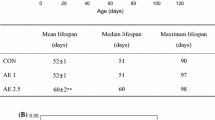Abstract.
Ageing can be defined as the time-dependent decline of physiological functions of an organism. The molecular causes for the ageing process are multiple, involving both genetic and environmental factors. It has been proposed that antioxidants may positively influence the ageing process, protecting the organism against free radical-induced damage. Here we show that the antioxidant N-acetylcysteine (NAC) has a life-extending effect on Drosophila melanogaster. Dietary uptake of NAC results in a dose-dependent increase in median and maximum life span. Flies fed on 1 mg/ml NAC food live 16.6% longer; at 10 mg/ml, life span increases by 26.6%. We have examined the effect of NAC treatment on protein and RNA levels we observe an NAC-dependent increase in absolute amounts of total RNA and ribosomal RNA, but no differences in protein levels. The NAC effect on longevity may involve differential expression of specific mRNA genes, as suggested by RNA fingerprinting experiments.
Similar content being viewed by others
Author information
Authors and Affiliations
Additional information
Received 13 August 1997; received after revision 1 October 1997; accepted 15 October 1997
Rights and permissions
About this article
Cite this article
Brack, C., Bechter-Thüring, E. & Labuhn, M. N-Acetylcysteine slows down ageing and increases the life span of Drosophila melanogaster. CMLS, Cell. mol. life sci. 53, 960–966 (1997). https://doi.org/10.1007/PL00013199
Issue Date:
DOI: https://doi.org/10.1007/PL00013199




